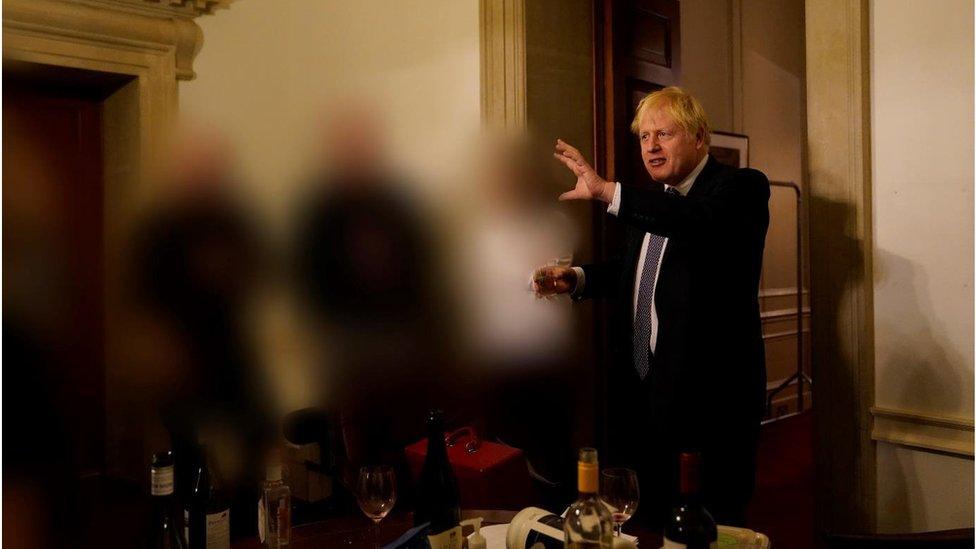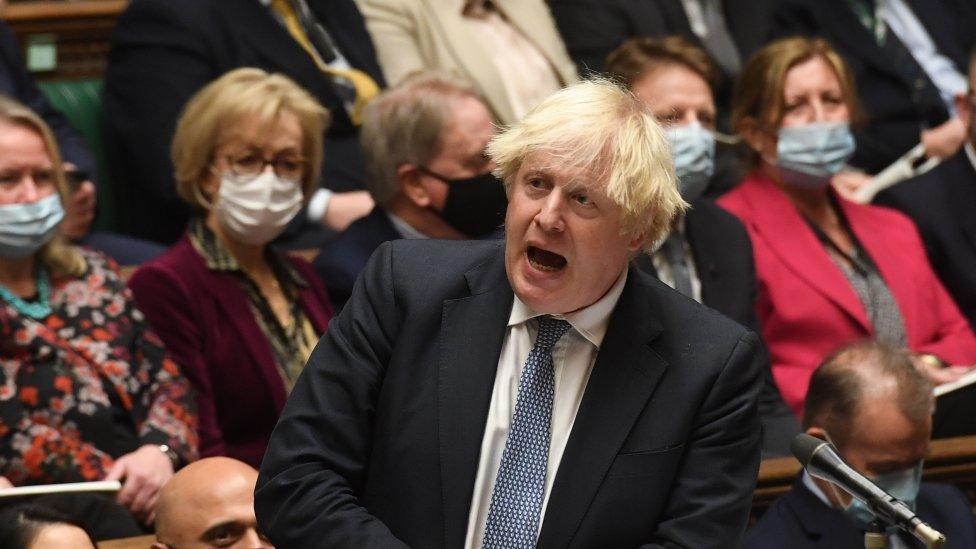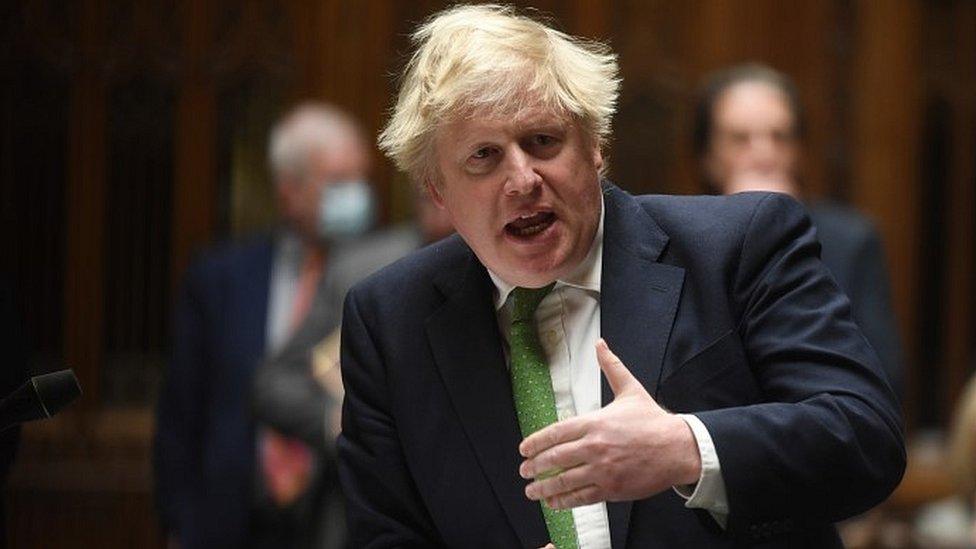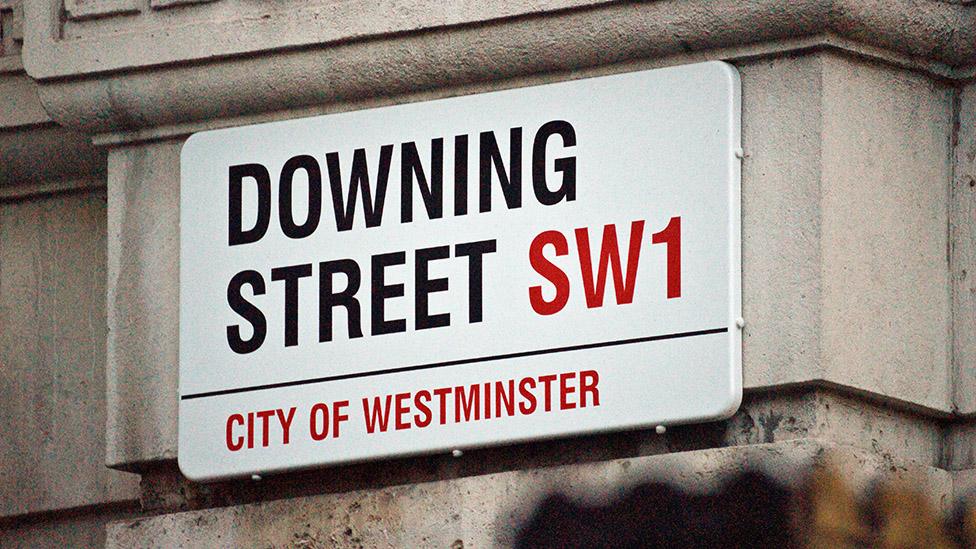Partygate probe is flawed and unfair, says lawyer advising Boris Johnson
- Published

Boris Johnson has said he did not deliberately mislead MPs over Partygate
An inquiry into whether Boris Johnson misled MPs over Partygate is "unfair" and "fundamentally flawed", a lawyer hired by the government has said.
A Commons committee is investigating what the outgoing prime minister told Parliament about Covid-rule breaking.
Mr Johnson could be suspended from Parliament or even lose his seat if they rule against him.
The government's legal advice strongly criticises the process but it cannot halt the inquiry.
Mr Johnson is due to step down as prime minister on Tuesday, a day after the winner of the Tory leadership race is announced. Voting in the contest closes at 17:00 BST on Friday.
The Commons Privileges Committee is investigating whether he obstructed the Commons by telling it that pandemic rules had been followed during lockdown events in No 10 that since led to Covid fines.
The soon-to-be-ex PM could be hauled before the committee in the autumn to account for what he previously told MPs.
Last month, the committee decided it would not have to prove Mr Johnson deliberately misled MPs to show he committed a "contempt of Parliament" by obstructing its work.
It made the decision after taking advice from a parliamentary official, who said intent was "not relevant" to deciding whether Mr Johnson broke the rules.
But Lord Pannick, the top lawyer hired by the government to examine the committee's approach, said the inquiry needs to establish "that Mr Johnson intended to mislead the House [of Commons] - that is that he knew that what he told the House was incorrect".
In his legal advice,, external the independent crossbench peer warns that "the threat of contempt proceedings for unintentional mistakes would have a seriously chilling effect" on MPs.
Lord Pannick says the committee's approach is inconsistent with past cases where intent was taken into account and the process would be deemed "unlawful" if it was tested in a court.
He criticises the committee for taking evidence anonymously and said Mr Johnson should be told the detail of the case against him.
The committee's own lawyer, former judge Sir Ernest Ryder, has previously defended this, external, saying potential witnesses may not be prepared to give evidence if their identity is made public.
A spokesperson for the committee said it would respond to Lord Pannick's arguments in due course.


As with so much when it comes to Boris Johnson, what people make of the conflicting opinions from lawyers is likely to depend on what they think of the man himself.
His supporters are likely to see Lord Pannick's contribution as "evidence" that the inquiry is a witchhunt stacked against Mr Johnson.
His detractors are likely to view it as an attempt to interfere with parliamentary process which suggests lessons have not been learned from the Owen Paterson saga.
Ultimately, legal opinions are just that: opinion.
This is about the procedures of the House of Commons and it is up to the committee to decide the terms.

Labour MP Chris Bryant - who chairs the Privileges Committee but is not taking part in the inquiry - suggested it was "very odd" the Cabinet Office had commissioned advice "on behalf of a private individual, namely the prime minister".
Speaking to the Today programme, Mr Bryant argued that ministers who unintentionally mislead or get a fact wrong "have a perfect opportunity to go through the House of Commons processes for correcting the record".
"The question for the Privileges Committee is simple: did he [Boris Johnson] mislead the house, and if he misled the house... is that a contempt of Parliament because he did not correct the record swiftly enough?"
Labour's Thangam Debbonaire suggested the government was "playing fast and loose with the rules" while the Liberal Democrat MP Christine Jardine said: "The government must fess up to the cost of this legal advice and stop expecting the taxpayers to pick up the tab for Conservative sleaze."
Parliament voted to launch the inquiry in April, after a series of revelations about events held in and around Downing Street while Covid restrictions were in place.
An official investigation later concluded rules had been broken and a police inquiry led to 83 people, including Mr Johnson himself, being fined.
The prime minister has admitted that previous statements to Parliament - in which he insisted all rules had been followed - had since been proved incorrect, but he believed them to be true at the time.
He denied deliberately misleading MPs.
Related topics
- Published22 March 2023

- Published21 July 2022

- Published25 May 2022
